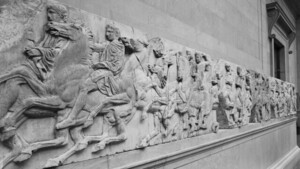There are no longer any talks between Britain and Greece about the Parthenon Marbles. Evangelos Kyriakidis instead makes a moral case.
What should museums do with artifacts that were found during colonial times? This is the question that has caused a rift between the governments of Greece and Britain.
It’s been more than 40 years since the Greek government tried to get the Parthenon Marbles back. In the UK, the policy has been a flat refusal for most of that time. However, over the past year, attempts to return the valuable artifacts have gained speed.
On November 15, George Osborne, who used to be Chancellor and chair of the British Museum, said that he hoped the museum could “reach an agreement with Greece.” Prime Minister Rishi Sunak quit the talks this week, ending this dream. This caused Greek Prime Minister Kyriakos Matsutakes to say he was “annoyed.”
These marbles from the Parthenon are also called the Elgin Marbles. They have been kept in the British Museum in London for more than two hundred years.
The statues that used to be on the Acropolis of Athens are called the Parthenon marbles. They were made between 447 and 438 BCE. From 1801 to 1812, the 7th Earl of Elgin gave permission for the works to be taken down and brought to Britain. At the time, he said that the Ottoman Empire, which was in charge, had given him permission to do so.
Around this time last year, UNESCO tried to help the two countries talk about returning the ancient Greek gems. The marbles have been a problem for Greece since 1983. Since then, Greek Prime Minister Matsutakes has made getting them back a big part of his talks with UK Prime Ministers Boris Johnson and Sunak.
During his trip to London today (November 28), Matsutakes was going to meet Sunak to talk about the war between Israel and Hamas, Russia’s invasion of Ukraine, and the White House.
But late Monday night, Mitsotakis put out a statement saying, “I’m annoyed that the British prime minister cancelled our planned meeting a few hours before it was supposed to happen.”
Britain said that the two leaders would not be meeting and that Mitsotakis would instead talk to Deputy Prime Minister Oliver Dowden. According to the BBC, the Greek leader turned down the offer.
“Friendship between Greece and Britain goes back a long time, and our two countries have a lot in common,” Mitsotakis said.
“Everyone knows what Greece thinks about the Parthenon sculptures. I had hoped to be able to talk about them with my British partner, along with the big problems the world is facing right now, like Gaza, Ukraine, climate change, and immigration.
“A person who thinks their views are reasonable and right should never be afraid to argue their case.”
Sunak’s office put out a statement that said, “The UK-Greece relationship is hugely important,” but it didn’t name the sculptures that were being argued over.
not legal reasons, but moral ones
Evangelos Kyriakidis, who is the director of The Heritage Management Organization and used to teach Aegean Prehistory as a senior professor at the University of Kent, thinks that the museum should look past the legal issues.
The British Museum says there is no formal case, but I don’t believe that to be true. “But I don’t want to talk about the law because I think the moral case is stronger,” he says.
Kyriakidis says that the Parthenon Marbles are such a problem for Greece because they are not only an important work of art but also a national symbol.
“It’s about freedom. It’s not right that the British Museum has a statue of the Greek flag in it. He says, “It’s like the Crown Jewels were in Greece.”
For Kyriakidis, the British Museum is an out-of-date institution because it is hanging on to a key national symbol. The British Museum bills itself as a global museum, but the world gets the wrong idea from that. Why is it called a British museum when most of the things you learn are about Persia or Greece? There aren’t many British artifacts there. It’s a holdover from colonial times.
Some people worry about three major things when they defend the British Museum’s right to keep artifacts from other cultures, like the Parthenon Marbles.
1) The original countries can’t store the artifacts;
2) If they start giving some things back, they’ll have to give everything back and have nothing left;
3) The British Museum is a great place to learn about world history for free.
Kyriakidis thinks that every one of these points has a good case against it. “It is true that Iraq does not yet have a good museum to store its artifacts. It might in the future, but not right now. Greece does, though. Greece built a museum just for that reason.
“The avalanche effect is another point of view. “If they give us back the Parthenon marbles, Italy will ask for this, Iran will ask for that, and so on,” Kyriakidis says. This reasoning doesn’t work, though, when you think about the fact that Greece is only asking for the Parthenon marbles back and not all of its other artifacts.
There are sculptures from another World Heritage site in Greece that are in the British Museum. The same person who created the Parthenon also built the Temple of Apollo Epikourios at Bassai, which is now in the British Museum. It was the first temple he worked on.




















